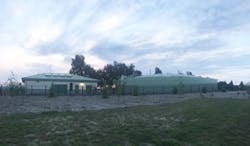Reducing Dependence on Groundwater
Located in the agricultural fields of the Central San Joaquin Valley of Northern California, the cities of Woodland and Davis—and the University of California, Davis (UC Davis)—previously depended entirely upon groundwater wells as the source of their potable water supply. This became a challenge, as the reliability and quality of the diminishing groundwater supply had declined and many of the groundwater wells were old. Faced with these problems and increasingly stringent wastewater discharge regulations, it became important for these communities to diversify their water supply.
In response to these issues, a new regional surface water treatment facility, located in Woodland, was designed to supply up to 30 mgd, with an option for future expansion to 34 mgd. The city's existing water facilities consisted of an elevated water storage tank, a network of distribution pipelines, pump stations and 20 groundwater wells. The city determined the need to construct a new ground-level storage tank and booster pump station, which was the first of its kind for the city.
DN Tanks was subcontracted to perform structural design, build and pre-stress the 3.0 million gal circular, concrete water storage tank conforming to AWWA D110 Type I standards and the Uniform Building Code for seismic criteria. The city selected a pre-stressed concrete tank for its durability, long life span, proven seismic performance and low maintenance. The tank was designed with an inside wall diameter of 130 ft and a wall height of 35 ft 3 in. The 10-in.-thick cast-in-place core wall utilized 480 cu yards of concrete, the 6.5-in.-thick floor consumed 403 cu yards of concrete and the freestanding concrete dome roof used 283 cu yards of concrete.
Moving toward a more sustainable water supply, the City of Woodland has taken preemptive steps toward diversifying its water portfolio. The city’s first pre-stressed concrete water storage tank provides some of the critical infrastructure as the new Surface Water Treatment Plant comes online. This tank and pump station provide the city’s needed redundancy, as it is the equivalent of three or four groundwater wells. By reducing their dependence on groundwater and increasing their reliable surface water supply, the cities of Woodland and Davis have a more sustainable water system to serve the region's needs for both existing customers and future growth.
